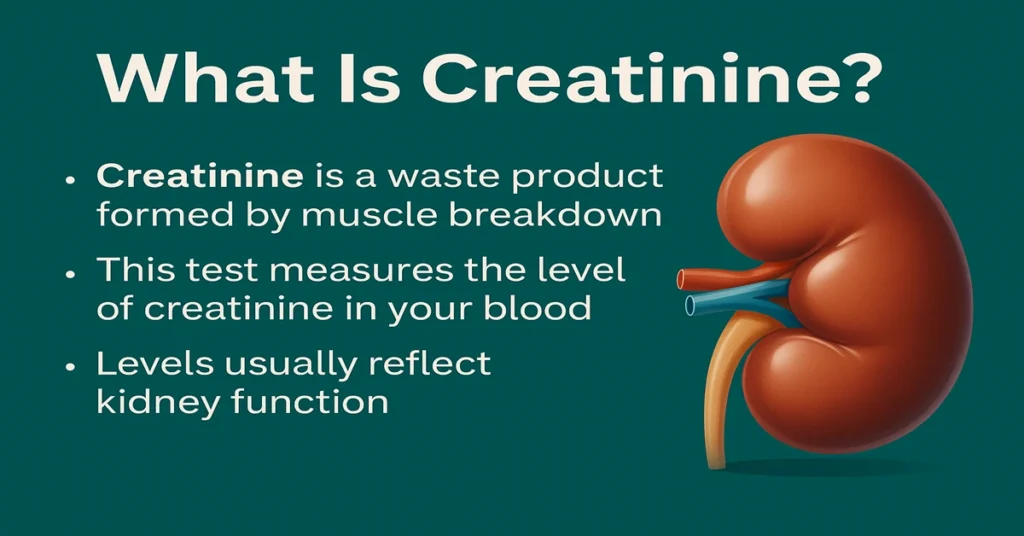What is Creatinine?
Creatinine is a waste product found in the blood, formed when muscles break down a substance called creatine. Creatine is an important molecule used by muscles to generate energy during physical activity.
Since healthy kidneys filter creatinine from the blood and remove it through urine, the Creatinine Test is one of the most reliable markers of kidney function.
Doctors often use creatinine levels to calculate the eGFR (estimated Glomerular Filtration Rate), which provides a more complete picture of overall kidney health.
Where is Creatinine Produced in the Body?
Unlike enzymes or hormones, creatinine is not directly synthesized by the body. Instead, it is a byproduct of energy metabolism:
- Creatine is made in the liver, kidneys, and pancreas.
- Creatine is stored in the muscles as creatine phosphate.
- When muscles use this stored energy, creatinine is formed.
- Creatinine enters the bloodstream and is later filtered by the kidneys and excreted in urine.
So, creatinine is a constant byproduct of muscle activity, making it a stable indicator of kidney function.
Main Functions and Importance
Creatinine has no direct biological function — it is simply waste.
Its importance lies in being a clinical marker of:
- Kidney health – how well your kidneys filter blood
- Muscle mass and activity – higher muscle mass means slightly higher creatinine
Elevated levels usually suggest that kidneys are not filtering properly.
Used to calculate eGFR, which is essential in detecting early kidney disease.
Causes of Low Creatinine Levels
Low creatinine is uncommon but may occur in conditions linked to reduced muscle mass or increased dilution of blood.
- Low muscle mass (elderly, bedridden, malnourished individuals)
- Severe liver disease (affects creatine production)
- Pregnancy (increased blood volume dilutes creatinine)
- Protein-deficient diet
- Muscle wasting diseases like muscular dystrophy
Symptoms of Low Creatinine
Often there are no direct symptoms.
If linked to muscle loss or disease, symptoms may include:
- Muscle weakness
- Fatigue and low energy
- Weight loss
- Poor physical strength
Causes of High Creatinine Levels
High creatinine (hypercreatininemia) is more common and usually signals kidney issues or other medical conditions.
Causes include:
- Kidney disease or kidney failure
- Dehydration (concentrates blood)
- High protein diet
- Medications – NSAIDs, ACE inhibitors, certain antibiotics
- Muscle injury or breakdown (rhabdomyolysis, trauma, intense exercise)
- Urinary tract obstruction (stones, enlarged prostate)
- Chronic conditions – Diabetes, Hypertension (both damage kidneys over time)
Symptoms of High Creatinine
If kidney dysfunction is the cause, symptoms may include:
- Swelling in face, feet, or hands (edema)
- Fatigue and weakness
- Shortness of breath
- Nausea or vomiting
- Confusion or poor concentration
- Changes in urination – less urine, foamy urine, or no urine
- High blood pressure
Reference Ranges (Normal Values)
(Normal ranges may vary slightly between laboratories)
| Group | Normal Range |
|---|---|
| Men | 0.7 – 1.3 mg/dL |
| Women | 0.6 – 1.1 mg/dL |
| Children | 0.3 – 1.0 mg/dL |
Men usually have slightly higher creatinine levels due to greater muscle mass.
Sample Type
- Sample Type: Serum (blood test)
- Tube Used: Red Top (Plain Tube)
- Fasting: Usually not required, unless part of a full kidney panel
Test Preparation
- No special fasting is required for creatinine test.
- Drink water as usual; avoid dehydration.
- Inform your doctor about medications, especially NSAIDs, antibiotics, or ACE inhibitors.
- Avoid intense exercise just before the test (can temporarily increase creatinine).
When to Consult a Doctor
You should seek medical advice if:
- Your creatinine is above normal range
- You have risk factors like diabetes, high blood pressure, or kidney disease
- You experience swelling, fatigue, or reduced urination
- Your doctor notices abnormal eGFR along with high creatinine
Important Word Explanations
| Term | Meaning |
|---|---|
| Creatine | Energy-storing molecule found in muscles. |
| Creatinine | Waste product formed when creatine breaks down. |
| eGFR | Estimated Glomerular Filtration Rate – measure of kidney’s filtering capacity. |
| Rhabdomyolysis | Breakdown of muscle tissue releasing creatinine and other waste. |
| Azotemia | Condition with high nitrogen waste products (including creatinine) in blood. |
~END~

